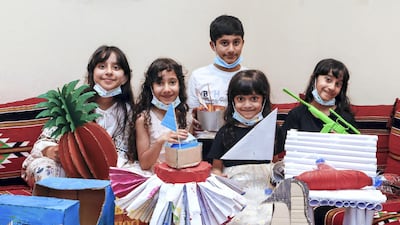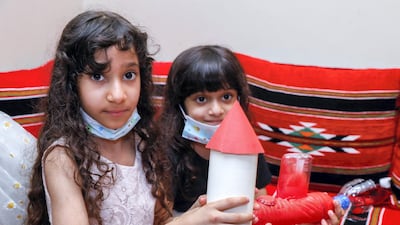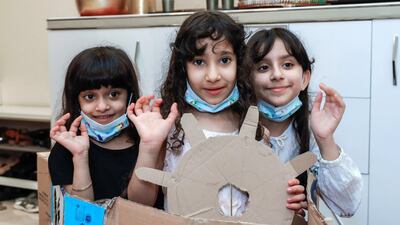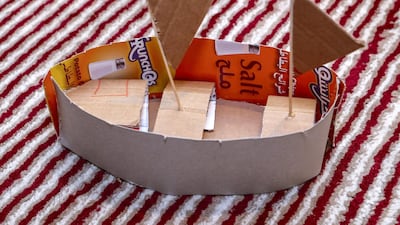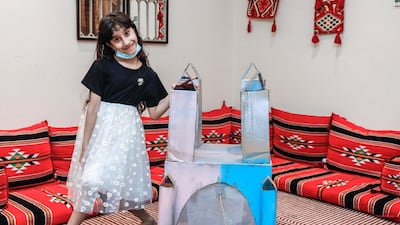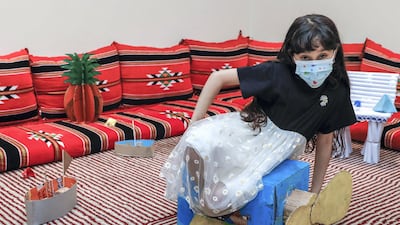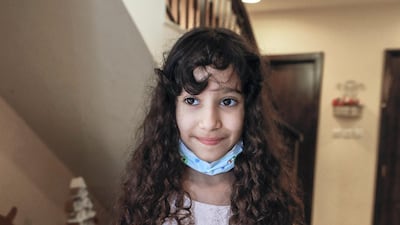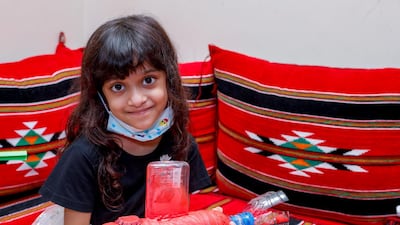Ahmed Alzaabi holds up a paper rocket he’s made. “I made a rocket because Hazza Al Mansouri went to space so I want to go to space,” the Emirati 11-year-old tells us.
Meanwhile, his 8-year-old sister Hind Alzaabi displays a castle she’s created from a box, complete with a functioning door, while their cousin 7-year-old Fatima Alzaabi shows off paper shoes and a skirt she’s made.
While these creations may seem different, they all have a common purpose: to teach science, technology, engineering and mathematics (Stem) skills in a creative manner, keeping children engaged and entertained.
It's all part of Adnoc's Stem@ Home programme, which was launched in May 2020. The online initiative, available to those aged 7 to 18, enables them to remotely access resources that help them learn new skills through science-based challenges. As of Tuesday, August 11, 9,600 children had enrolled.
How does it work?
The free programme is open to all to enrol. Children can register their name with Adnoc by sending an email adnocstem@adnoc.ae after which they are asked to fill out a form.
Challenges and activities are then posted on Facebook, WhatsApp, email and a shared drive. Each challenge has a PDF that gives detailed instructions on how to complete the challenge.
The challenges can be completed independently by the children, or with the support of parents or caregivers. It is designed to be flexible so that families can participate as much as they like, according to their available time and interest.
“We believe in a pedagogy that is driven by exploration, intrinsic curiosity and real world problem solving,” an Adnoc representative tells us of the programme. “Accordingly, we do not give solutions or answers to the challenges, but rather lead students into the middle of a challenge and ask them to find their own answers and solutions. Many of our challenges do not have one correct answer, but rather invite open-ended, creative problem solving. This better reflects what it is like to work as an engineer.”
Inspiring a new generation of engineers
To better support the children, the initiative has brought in a number of volunteers or champions. Asma Alzaabi is an Emirati champion who has been mentoring 55 Emirati students in the programme.
“Well, at first I received an email from my university about being an Emirati champion for Adnoc. So, I thought it would be a great opportunity since it is related to my major which is engineering and at the same time it would be something fun to do at home,” the 20-year-old university student says.
Asma has been interacting with the students and their parents by posting details about the daily tasks on WhatsApp. Pictures and videos of the completed projects are then uploaded online.
“My job is to compliment, motivate and inspire them,” she says. “They were really shocked that they have the skills to invent and create. I was so happy to be a part of that.”
“It’s all about discovering your skills,” she adds. “Behind every task, there is a lesson.”
The programme included activities that can be completed in two to five hours, competitions, and a series of three two-week summer camps. The camp themes are paper power (engineering with paper), marine engineering (which taught children topics like density and buoyancy), and energy for life, which explores the global supply chain.
Meanwhile, the programme has helped children in more ways than one, says Aisha Alteneiji, mother to Fatima and Noora Alzaabi, who have both enrolled.
“The programme has helped them improve their intellectual knowledge. They started to become more motivated and search the Internet on their own and really enjoy the projects," she says.
“It didn’t just improve their skills, but their personalities,” she adds. “They were so shy but with the process of filming themselves and their projects, they have become more confident.”
Adnoc’s Stem@Home summer programme will run until Thursday, August 20. Meanwhile Adnoc’s Stem programme is an ongoing, multi-year effort to improve stem education and inspire the next generation of engineers and innovators.
